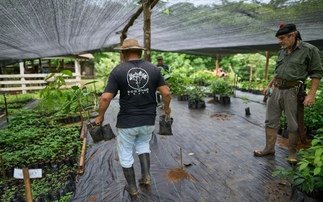Credit: iStock
Experts claim more stringent approach and management of carbon market could allow it to play a 'meaningful role' in tackling climate crisis
The Climate Crisis Advisory Group (CCAG) has called for the introduction of robust scientific standards and transparency measures to determine what "counts" as a credible carbon credit and help unlock the enormous potential of the Voluntary Carbon Market (VCM).
The latest report from the group of global climate experts chaired by Sir David King has set out seven recommendations that go beyond the Oxford Offsetting principles and aim to provide a detailed roadmap for the VCM to overcome recent criticism and rebuild trust in the efficacy of carbon offset projects.
Voluntary Carbon Markets: Pitfalls, Potential & the Path Forward offers guidance on how to use rigorous scientific measurement, monitoring, and reporting principles to create a revitalised market that has potential to make a much-needed contribution to the net zero transition.
It also sets boundaries for the legitimate use of carbon credits, stressing they cannot be used to leave carbon removal development and carbon sink preservation to market forces, nor can vulnerable "green" carbon sinks meaningfully offset "black" carbon emissions.
CCAG calls for a greater focus on projects that deliver real emissions reductions while redistributing finance and delivering meaningful co-benefits to local communities where projects are based. And it stresses the need for international and state regulation to guarantee the quality of credits and ensure organisations take all feasible steps to reduce emissions before engaging with the VCM.
The report also flags financial transparency as a critical step towards building trust and confidence in absence of international and state regulation - a move the report's authors claim would help to expose unethical practices and secure a fairer deal for communities and project implementers.
"There must be a stringent approach and management to VCM practices in order for the market to play a meaningful role in mitigating the climate crisis," said the report's lead author and CCAG member, Professor Mark Maslin. "However, this will not be achieved without a strong and standardised commitment from all actors within the system.
"Carbon credits can be viable as part of a set of tools to fund emissions mitigation projects around the world - but their value must be based on clear scientific principles, and deliver real, tangible value to the health of the planet."
The report also adds to the growing calls for more standardised monitoring, reporting, and verification within the VCM and recommends the establishment of independent oversight bodies at a national, regional, and global level.
"There is no doubt that the voluntary carbon market faces immense challenges if it is to play a significant role moving forward," said CCAG chair Sir David King. "But I do believe that if it is based on robust scientific principles and is implemented transparently, the VCM has the potential to be a significant force for good.
"The science is clear: we need to be pulling every lever available to us to help tackle the climate crisis. This is one such lever and we should be doing everything possible to ensure that it is fit for purpose."
The calls coincide with the launch of a claimed "world first" innovation in carbon removal market transparency, after Supercritical unveiled live pricing and availability data for biochar projects this week.
Named as one of the World Economic Forum's Technology Pioneers for 2024, the firm now claims to offer a single view of live pricing and availability data across 80 per cent of the biochar solutions available on its platform - each of which has been subject to a 118-point vetting protocol covering climate science, environmental impact, delivery risk and social benefits.
The release of CCAG's latest report also comes just days after the launch of a new paper from global carbon ratings agency BeZero Carbon forecasting that a $100bn global carbon market would have the potential to protect and restore 150 million hectares of land - an area equivalent to the size of Peru.
The analysis also claimed a $100bn market for carbon credits could remove or avoid 1.2 billion tonnes of CO2e each year and create 17 million jobs.
Citing BloombergNEF estimates, BeZero claimed that a market of this size and scope could be achieved in the mid-2030s, at which point total annual demand for credits would reach $2.5bn at an average price of around $40.
"The narrative in carbon markets too often forgets why those working in the space are giving their careers to make it a long-term success," said Tommy Ricketts, CEO and co-founder of BeZero Carbon. "BeZero Carbon's latest report shows how a $100bn project-based carbon market would deliver immense benefits for the planet and people.
"It means companies spending billions on new technologies and land restoration. It will support more jobs than the oil and gas sector worldwide - all whilst making a dent in our global footprint."
In related news, Mercedes-AMG Petronas F1 Team announced fresh investment in a raft of carbon removal initiatives, including its first investment in permanent, technology-based carbon removals and a three-year commitment to a soil carbon removal project in the UK.
The team claims its agreement with Frontier - a carbon removal investment programme founded by Stripe, Alphabet, Shopify, Meta and McKinsey - would help accelerate the development of carbon removal technologies that store carbon permanently, do not compete for arable land, and have a path to being affordable at scale.
Mercedes anticipates carbon removal credits secured with Frontier will contribute to the team's permanent removals as early as 2027 as it seeks to deliver a 75 per cent reduction in emissions by 2030 and drive towards its target of a net zero emission supply chain by 2040.
Moreover, Swiss carbon removal company Neustark announced this week that it has raised $69m to fuel its expansion across Europe, North America, and Asia-Pacific regions and support its mission of removing one million tonnes of CO2 a year by 2030.
Keep up to date with all the latest green business news by signing up to the free Daily and Weekly BusinessGreen Newsletters.









